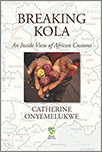Review — BREAKING KOLA: An Inside View of African Customs by Katherine Onyemelukwe (Nigeria)
 Breaking Kola: An Inside View of African Customs
Breaking Kola: An Inside View of African Customs
Katherine Onyemelukwe (Nigeria 1962–64)
Peace Corps Writers
November 2018
251 pages
$14.62 (paperback); $9.99 (Kindle)
Reviewed by Tom Hebert (Nigeria 1962-64)
•
Like military veterans, Peace Corps Volunteers never put their stories and accomplishments behind them. As we say, “Once a Peace Corps Volunteer, always a Peace Corps Volunteer.”
But very few of us have been as totally immersed in a new culture as the author of this intense but bright and sunny book. Having taught cross cultural communication at the State Department, I knew this author wrote truthfully when I read these words on page 16: “Breaking Kola is my attempt to explain African, especially Igbo customs that that build this deep sense of community.”
I mention that because for over 58 years more than 235,000 Americans have served in 141 countries. And, when they return to this country, their devotion to community service continues. Indeed, the Third Goal of Peace Corps service is, “To contribute to the education of America and to more intelligent participation in the world.”
Catherine Onyemelukwe served as a Peace Corps Volunteer in Nigeria from 1962 to 1964. She met and married a good man from the Igbo tribe whose homeland is in Eastern Nigeria, and lived with him and his extended family over two decades.
As she explains in Chapter 11 of her enlightening and exciting book, Two-Year Assignment, Lifetime Commitment: “I did become a part of Clem’s family and worked hard to fit in, speak the language, and accept the customs.” Her reflections are fun to read and revealing of her interactions with the culture.
She now lives with her husband in Westport, Connecticut. But this reader suspects that she left her heart in Igbo-land.
•
Tom Hebert (Nigeria 1962-64) lives on the Umatilla Indian reservation outside Pendleton, Oregon. He is the co-author of three books on higher education and a columnist for the Confederated Umatilla Journal.
Tom: Thanks for the book review. I live in Portland, and I think we met or at least corresponded sometime ago regarding Bob Textor’s Thirster gatherings in Portland. At any rate, I appreciated your book review, and wanted to ask you if you remember Cynthia Courtney, the staff person from Peace Corps Washington responsible for the Nigeria programs? I worked with her in the Africa Regional Office of PC/W, but lost track of her over the years. Thanks for the review. David
David, good to hear from you. Yes, we exchanged some emails about the Thirster gatherings in Portland. I had hoped to attend one on my way to the ocean with my horse in tow. But I chickened out because I didn’t want to get lost in Portland with a horse in tow. But if you ever get to Pendleton you can ride my horse and drinks later on this olde duffer.
David I spotted your comment about PC/HQ West Africa staff Cynthia Courtney who I remember, too, from working at HQ in 1962-63. Many people say novelist Fletcher Knebel used Cynthia as a prototype for one of his characters in his novel on the Peace Corps, The ZinZin Road.
Knebel had been hired by Charlie Peters to evaluate Liberia and after that trip he wrote his 1966 novel about PCVs in Africa. The character based on Courtney is called Maureen Sutherland “…a slim, willowy young woman, stylish dressed….She wore elongated dark glasses, and a sheaf of black hair fell loosely over one eye. Her skin, as creamy as enameled china, hinted of regular facials and a variety of expensive oils and ointments.”
Courtney was famous in the early Sixties for frequently flying into West Africa for brief, whirlwind fact-finding trips, which she breezily referred to as a “look/see.”
Knebel describes his PC/W official on a visit to Africa–“Miss Sutherland lilted on for half an hour, festively dropping names from Lagos to Washington….she gave a glittering panorama of the world of great affairs, its intrigues, its grand policies and even its illicit loves…She concluded on a pitch of finishing-school breathlessness and looked about brightly as though waiting for applause.”
Welcome to Peace Corps/Washington!
I never met Cynthia Courtney but I remember that she argued that PCVs didn’t need refrigerators because their Nigerian counterparts didn’t have them. Apparently she didn’t understand that Nigerians had extended families and could parcel out duties among them.